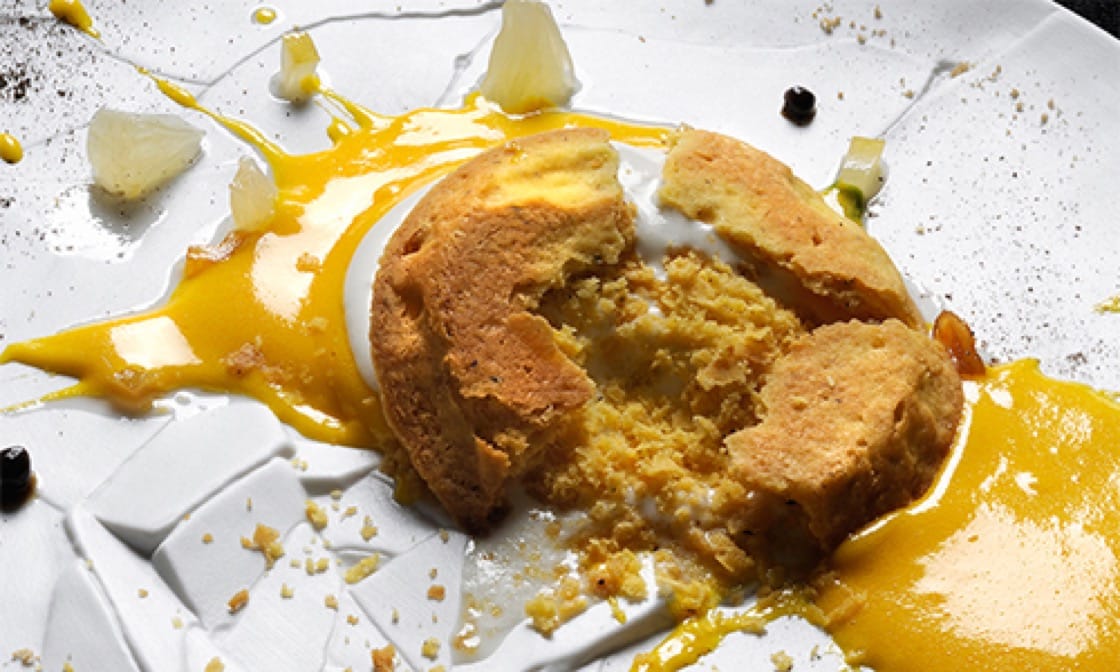In both name and execution, his dishes reflect the new paradigm he has created around Italian food: you certainly wouldn’t find Oops I Dropped The Lemon Tart, All The Tongues of the World, and Memories of a Mortadella Sandwich on any other menus. One thing is clear: pushing boundaries, innovation and fearlessness has made for a hugely successful combination.
What was your first encounter with the MICHELIN Guide?
It was when I was traveling with my older brothers in Italy in the 1970s. They kept looking at this little red book, a little beaten-up edition that my father always kept in his blue Alfa Romeo. One day when I was sitting in the car while my brother was getting gas, I started looking closer at the book. In March 1986, when I opened my first restaurant, Trattoria del Campazzo, I told my father, “You’ll see, Dad, someday I’ll have a Michelin star too!” He wasn’t happy that I had left law school. He didn’t want me to become a chef. Fortunately he lived long enough to see me receive one, two and three Michelin stars!

The first time I got a star was in November 2001, when Osteria Francescana made it into the 2002 MICHELIN Guide.
The first thing I did when I realized we had won a star was run out of the restaurant and onto our street, which was actually named Via Stella (Star Street), and fall to my knees. It was a damp and cold night in late November, and I raised my arms to the sky and I shouted, “We did it!”
How did you celebrate?
That Christmas, as a present to the team, we made a commemorative t-shirt with the date, a red Michelin star symbol and the sentence: Ma dove vuole arrivare questa pasta e fagioli? (Where do these pasta and beans want to go?) It had taken us six years to get a Michelin star, but we knew it was just the beginning of our journey.
How much influence/inspiration does the Michelin Guide have on your career?
The influence of the MICHELIN Guide on my career has been enormous. First, I had something to fight for, namely my first Michelin star. When we received that, we gained the recognition we needed to attract international guests—they stimulated our kitchens and pushed us to improve. Working for the second Michelin star forced us to take risks, to challenge ourselves, and to grow in ways we could not have imaged.
Then, once again, reaching for that third Michelin star, we put pressure on ourselves to be the best Osteria Francescana that we possibly could. For me, the MICHELIN Guide has stimulated me and my team to dream, to mature, and evolve together toward a common goal. And once you have three Michelin stars, you want to go out into the world to teach and to inspire others. Thank you, Michelin.

Be humble. When you think you know everything, you’ve stopped growing. You need humility to be open to experiences and to learning. Keep your eyes open and ask questions.
Secondly, I tell young chefs to follow their passions whatever they may be: music, travel, language, art, poetry, etc. These passions are what give your work in the kitchen meaning and fuel your creative spirit.
Thirdly, invest in your education, and I don’t only mean your culinary education. Take the time to travel, read and learn about the history and the world. Culture leads to the evolution of the kitchen. The more we know and learn about the world around us, the better chefs we are because cooking is not just about quality of the ingredients, but the quality of the ideas.
This article originally appeared on the MICHELIN Guide Singapore website.
















